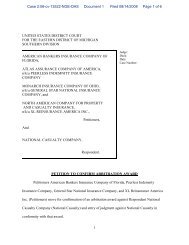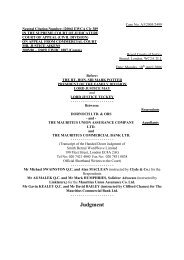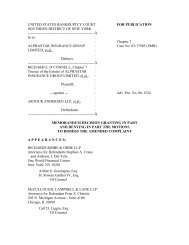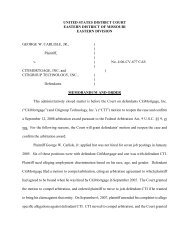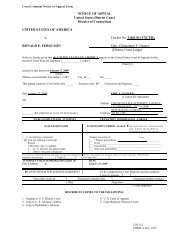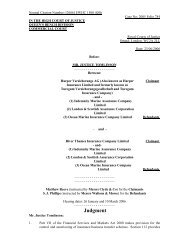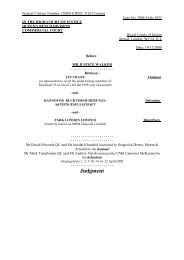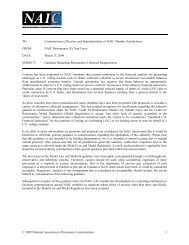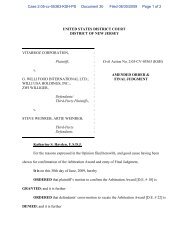Statutory Issue Paper No62R - Reinsurance Focus
Statutory Issue Paper No62R - Reinsurance Focus
Statutory Issue Paper No62R - Reinsurance Focus
You also want an ePaper? Increase the reach of your titles
YUMPU automatically turns print PDFs into web optimized ePapers that Google loves.
Property and Casualty <strong>Reinsurance</strong><br />
SSAP No. 62R<br />
SSAP NO. 62—EXHIBIT A<br />
Implementation Questions and Answers<br />
Applicability<br />
1. Q: The accounting practices in SSAP No. 62 specify the accounting and reporting for<br />
reinsurance contracts. What contracts are considered reinsurance contracts for purposes<br />
of applying these accounting practices?<br />
A: Any transaction that indemnifies an insurer against loss or liability relating to insurance<br />
risk shall be accounted for in accordance with the accounting practices included in SSAP<br />
No. 62. Therefore, all contracts, including contracts that may not be structured or<br />
described as reinsurance, shall be accounted for as reinsurance when those conditions are<br />
met.<br />
2. Q: The provisions of this statement will apply to (a) reinsurance contracts entered into,<br />
renewed or amended on or after January 1, 1994, and (b) any other reinsurance contracts<br />
that are in force on January 1, 1995 and cover insurable events on the underlying<br />
insurance policies that occur on or after that date. What contracts would be exempt from<br />
the new accounting rules included in SSAP No. 62?<br />
A: The only exempt contracts are:<br />
1) Purely retroactive reinsurance contracts that cover only insured events occurring<br />
before January 1, 1994, provided those contracts were entered into before that<br />
date and are not subsequently amended and<br />
2) Contracts that expired before January 1, 1995 and are not amended after that<br />
date.<br />
3. Q: This statement is to be applied to contracts which are amended on or after<br />
January 1, 1994. What if the change in terms is not significant, or the terms changed have<br />
no financial effect on the contract?<br />
A: In general, the term amendment should be viewed broadly to include all but the most<br />
trivial changes. Examples of amendments include, but are not limited to, replacing one<br />
assuming entity with another (including an affiliated entity), or modifying the contract’s<br />
limit, coverage, premiums, commissions, or experience-related adjustable features. No<br />
distinction is made between financial and non-financial terms.<br />
4. Q: Must the accounting provisions of SSAP No. 62 be applied to an otherwise exempt<br />
contract if the ceding entity pays additional premiums under the contract on or after<br />
January 1, 1994?<br />
A: The answer depends on why the additional premiums are paid. If the additional premiums<br />
are the result of a renegotiation, adjustment, or extension of terms, the contract is subject<br />
to the accounting provisions of SSAP No. 62. However, additional premiums paid<br />
without renegotiation, adjustment, or extension of terms would not make an otherwise<br />
exempt contract subject to those provisions.<br />
© 2009 National Association of Insurance Commissioners 62-24


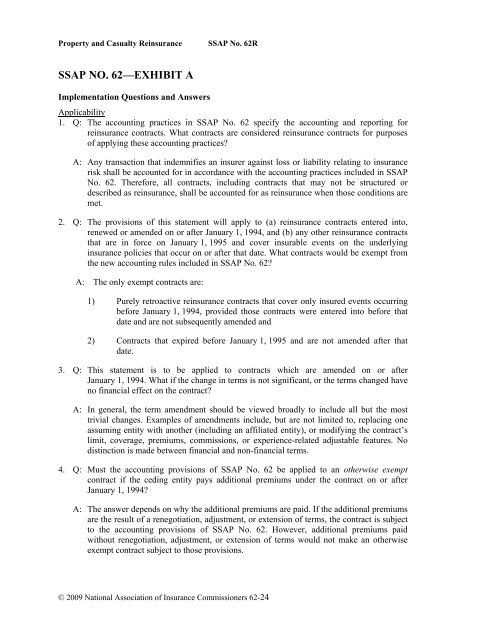
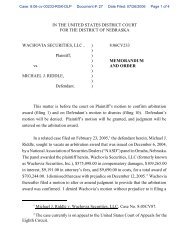
![202 Folio No 734 Neutral Citation Number: [2006] EWHC 1345 (QB ...](https://img.yumpu.com/50015000/1/184x260/202-folio-no-734-neutral-citation-number-2006-ewhc-1345-qb-.jpg?quality=85)
